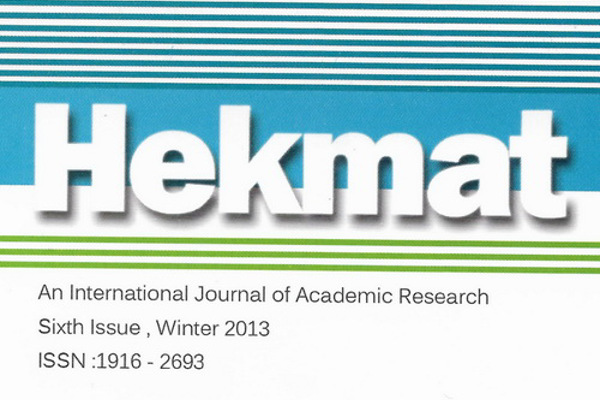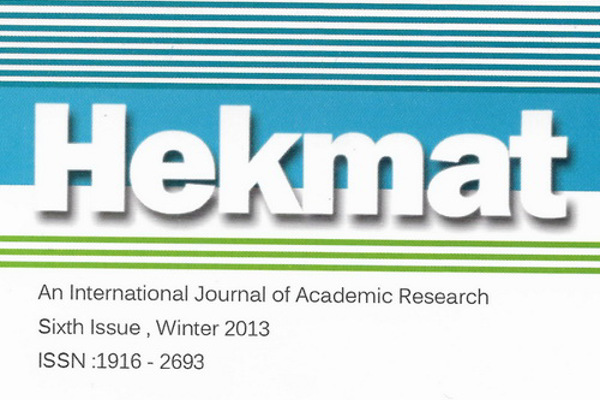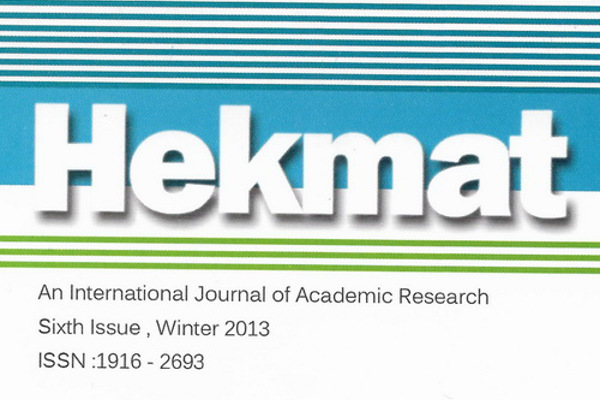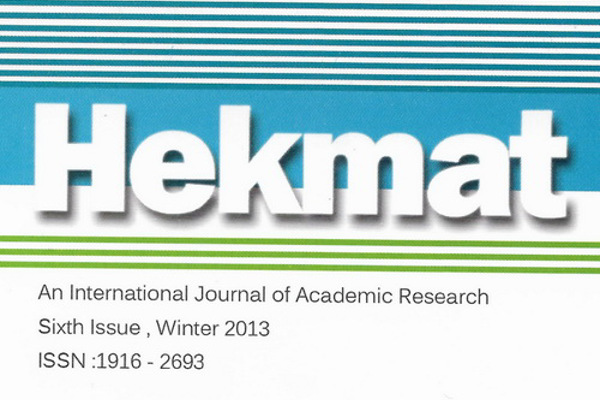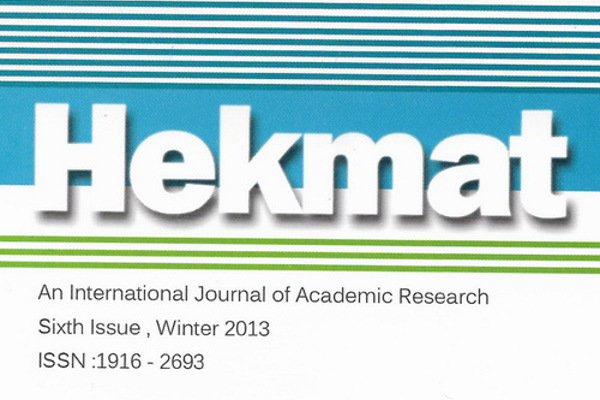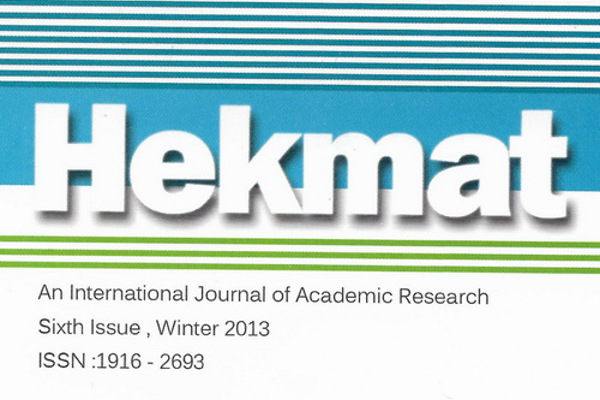Editorial
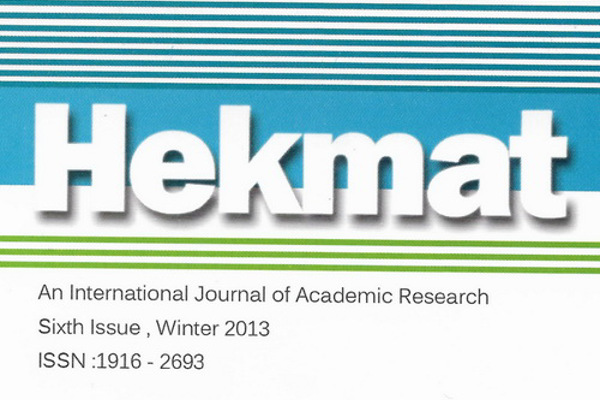
Editorial
The twentieth century and especially its latter half abound with rapid unprecedented ecological developments world over. Man’s influence on nature through human activities has reached a global level and has unfortunately been so fast. No natural ecosystem or living place anywhere on this globe could escape this influence at least partly. But the positive fact here is that it is in the present age alone that man’s attention has been focused on this phenomenon and world community has come to express worries mingled with cynicism about it though it seems to be too late.
Man’s faculty of thinking and reasoning inspired an expectation in people especially in the eighteenth century Europe that he will one day acquire such a huge power that enables him to control nature and preserve his environment of life. But the actual progress of technology took a different course; man is increasingly changing the natural environment in a manner endangering life and jeopardizing his very existence.
The picture is so vivid that no one asks any reason for the assumption that the planet earth is going from bad to worse heading to ultimate ruin but the opposite assumption needs be substantiated by arguments that can justify it.
At any rate, most ecological problems have now developed to the stage of universal calamities no more confined in a region or nation. This is in addition to the fact that even ecological bottlenecks of local character are also general and global in another sense; each one of them usually involves so many economical, cultural, political, ethical, philosophical, even mystical and in a sense, geopolitical dimensions that hardly remain confined to a particular location. The material and spiritual aspects of human life are so interwoven that even the smallest abnormality in one area leave far reaching repercussions world over thanks to the phenomenon of globalization. So, a problem one nation suffers from is indeed the problem of humanity.
In this prologue we try to explain the relation of geopolitical issues particularly the challenges poverty rises to ecological issues and draw the attention of leaders, socio-cultural policy makers and thinkers to this global fundamental challenge;
Geopolitics
Geopolitics is defined as the study of international relations and disputes from the geographical point of view. According to this definition, the location of natural resources, their situation, their distance from population centers, their distribution patterns and the features of human resources play very important a role in international relations.
Geography is divided into two main branches; natural and human. In natural geography, studies include natural systems on the earth, their position, their distributions and various aspects. So, climate, plants in different regions and continents, the features of the surface of the earth and their causes, the relations between these elements are studied in natural geography. In human geography, relations between human societies, cultures and civilizations and the range of their spreading are studied. Geopolitics is a branch of human geography.
Social science, economics, political science, cultural studies and their achievements are used in geopolitics as raw material next to the study of ecological forces in order to carry out geopolitical analysis.
A great part of present international debates are centered on environment. The ecological themes are subject maters for geopolitics because repercussions of increasing consumption of natural raw materials leading to destruction of bio resources in the world are not limited to conventional borders of countries.
But what is environment? One simple definition says environment is all the living or inanimate elements around man with internal relations linking them together. In nineteenth century, scientists used the concept “living place” to define the environment on the planet earth and the relation among organisms and inanimate elements therein.
Ecosystems or biosphere is applied to a vast area on the earth where different species of vegetative and animal life exist and the interactions among them. Theoretically speaking, it is hard or rather impossible to say that political conventional borders between countries correspond with existing ecosystem borders. for example, immigrating birds flying from Siberia in the north to Iran or other countries in the south at the start of winter season and returning in the summer to their original loci like the wild gooses who travelled to and fro Soviet Union and U. S. A. during cold war period lived their lives indifferent to the political disputes and wars that went on. Accordingly, geopolitics is concerned only with the international relations and disputes in global level from the biological effects point of view.
The main subject of geopolitical disputes is the natural resources that are moving geographically across countries borders. Among them are fish reserves, oil reserves underground, Border Rivers and lakes, immigrating wild animals and the like. Countries trying to maximize their utilization of these resources cause conflicts and wars between neighboring nations.
Now the question arises what the proper utilization of natural resources is. Is it right to consume them utterly? Does state enjoy the right to take whatever measures they see appropriate within their national borders about how to use natural resources? Giving positive answer to these questions brings about serious challenge tensions in case of resources like wild life, uranium mines, air and water.
The concept of natural resources in geopolitics
At present, western industrial nations are the major consumers of world natural resources. But in coming years developing nations replace them in this respect due to rapid growth of population and economic development that results in more consumption of raw materials. This would leave a profound effect on the ecosystems of this planet and the natural resources we increasingly become scarce. Natural resources are essentially scares in the sense that they are limited in quantity and position. Due to this fact as the result of the present pattern of economy growth, geopolitical clashes and walls for dominion over these resources would increase considerably. The winning party will enjoy access to more resources and be able to consume more. Historically speaking, the rapid expansion of British colonies started up after the industrial revolution in Europe when the natural resources in this continent began to diminish.
Natural resources are classified into two groups. One group is renewable. It is possible to utilize these resources according to a proper management pattern in quite a long period of time reasonably constantly. This group includes air, drinkable water, forests, animals and fish. Another group is not renewable. A fixed quantity of these resources is available in the world. They would finish sometime. The fossil fuels, coals another minimal materials to or examples of this type of natural resources.
As we said in the definition of renewable natural resources, proper management and reasonable utilization are two principal conditions for sustenance of these resources and for the possibility of their renewability. Excessive utilization and improper management or the absence of proper management for replacement of what is consumed may lead to these resources becoming exhausted. Likewise if water air and soil are polluted too much it would be impossible to renew them. Some studies carried out by the United Nations in years 1992 to 1995 indicate that 89,000,000 acres of the land are gravely damaged that cannot be revived more and water reserves have become so low that in the future almost 80 countries of the world will face the problem of draught.
In border disputes between countries especially when liquid bio resources are at stake, sometimes it is possible to delimit the borderline in a manner that some rights of other countries are violated. For this reason it is necessary that political representatives of countries especially top negotiators possess sufficient information about the ecological situation of the country and know very well the value of resources and their locations.
As the result of the widening gulf between wealthy countries and developing nations the globalized ecological damages have given rise to a series crisis in the biosphere of planet earth. The themes we shall mention in this section are all of extra territorial aspect that requires corporation and understanding among all nations to address.
Greenhouse effect or the increase in the temperature of the earth
Consumption of fossil fuel results in the production of different gasses like carbon dioxide. When these gasses increase in amount and accumulate excessively in the atmosphere of the earth, a thick layer of gases is produced that plays the role of plastic roof of greenhouses. It keeps the heat produced by sunshine near the surface of the earth and prevents the additional heat form returning towards higher layers of the atmosphere. This causes the increase of temperature on the earth.
Scientists estimate the increase of the temperature of the earth during the present century to be between 8/1000 to 3.5/100 degrees centigrade as the result of this ecological phenomenon. The repercussions of the situation will emerge in forms of vast climate change in different regions on the earth and events like great storms, floods or draught and faster melting of the ice in northern pole as a result of which sea level rises and many low coastal areas and cultivable land submerge.
Rio convention in 1992 was signed by more than 50 countries and Kyoto protocol in 1997 was signed by more than 160 countries including Iran in order to put an end to the alarming growth of the danger and to control the pollution caused by greenhouse gases.
Ozone layer becoming thinner
The second major ecological concern with worldwide repercussions is the damage to ozone layer that protects the atmosphere of the earth. This layer surrounds the planet earth approximately 24 km above the surface of the earth and out absorbs the ultraviolet rays of the sunshine thereby protecting the earth and organisms from these harmful rays.
Scientific research has shown that the gas combination of chlorofluorocarbon (CFC) damages ozone layer and makes it thinner. It has already made several holes in this layer. This combination is used in the refrigerators and in different types of sprays and in the production of some industrial materials.
The holes in the ozone layer continued to become wider so much so that world countries affected 1985 Vienna convention and the annexed protocols of Montreal in 1987 and the London amendment in 1990 charging industrial countries with the compulsory task of reducing the consumption of these materials to half.
Shortage of drinkable water
Water reserves in our planet have long been considered among renewable natural resources though these reserves are in danger globally. Over 40% of countries suffer from water shortage now as a result of population growth, agricultural development pollution of water reservoirs both underground and on the surface as well as industrial consumption. The annual increase in the need for water is at proximately 3.2% level. To meet this challenge World Bank has invested around $600,000,000,000 in different countries to increase the reserves of drinking water and to combat draught up to the year 2005.
One of very important geopolitical issues in the present age is sovereignty over water reserves. As the main liquid natural resource water flows and passes across conventional borders of different countries and this gives rise to sensitivities. For example in areas where great reveres pass across different neighboring countries, the way the countries located on higher land utilize water and the natural wealth therein affects those countries which are located on lower level. This issue has always been controversial among countries. The river Rhine in Europe, the rivers Oxus and Jaxartes in Asia minor, the rivers Gang and Indus in the subcontinent of India and Jordan river in the Mediterranean up on examples of these reserves. Since in the case of Iran too major rivers like Arax River, Tigris River and Atrek River are located in border regions and pass through neighboring countries, a proper political planning is needed in order to be able to benefit from them.
Desert expansion and scarcity of fertile soil
There are approximately 13.4 billion hectares of land on this planet. Not all of it is utilizable. Only 22 percent of the total land on the planet is cultivable. But most of the lands under cultivation world over are susceptible to erosion and decay. Scientific investigations show that 11 percent of world fertile lands are already too much spoiled to be revived. Two third of the soil in developing countries in Asia and Africa are seriously damaged due to traditional agricultural and irrigational methods, excessive use of chemical fertilizers and poisons and uncontrolled grazing on natural pastures. As the result, the desert is advancing in many regions of the world including Iran.
Air pollution and Acidic rains
Acidic rains are a kind of air pollution. Sulfur dioxide and nitrous oxide gasses are produced as the result of fossil fuels consumption and are combined with water wrapper in the air thereby making huge amounts of sulfuric and nitric acids that soar over wide areas along with clouds. When it rains these gasses too return to the ground and cause grave damage to forests, plantations, and buildings and even penetrate to water reserves underground spoiling everything in human reach. 25 percent of jungles in Europe were damaged or virtually destroyed by such rains. Since wind direction over the earth is usually from the center to the north, contamination in countries in the south is transferred naturally to the north.
Contaminated waste disposal
Industrial activities involve large quantities of toxic wastes the disposal of which usually leads to the spread of contamination in the environment. Toxic metals such as zinc, copper and mercury are dangerous to living organisms hence environment. The main source of the spread of these materials is activities aimed at exploration and exploitation of mines because theses wastes are not properly disposed of usually.
Transportation of dangerous toxic materials too constitutes a great concern for the safety of environment all over the world. In Iran, theses concerns include disposal of agricultural poisons, outdated materials usable for protection of crops against pests, acidic remains of reiterated refinement of oil, refinery wastes, and the like.
Jungles elimination Process and the destruction of bio variety
Trees are among renewable resources though man has utilized forests throughout history so extravagantly that this valuable natural source is now on the verge of utter extinction. Much of the forest coverage in northern hemisphere is virtually exhausted. In Iran, the area under forest coverage has reduced almost a million hectares during last forty years. Although trees are not considered moving natural resources, the vast destruction of jungles can lead to geopolitical problems of serious consequences for the following reasons:
- elimination of tree coverage results in rapid erosion of soil and pollution of rivers and other water resources
- Increased absorbing of carbon dioxide and decrease in production of oxygen hence deterioration of the problem of greenhouse effect.
- Serious damage to bio variety on the earth.
Bio variety means the sum of plant species, animal species, micro organisms, ecosystems and all ecological processes relevant to them. One can claim that all those ecological problems world faces which man has a role in somehow threat bio variety on the earth. The extinction of over 1622 species of plants and animals during the last three centuries witnesses to the grave challenge man is faced with. Scientists believe that a number of species are getting extinct annually though man may not be in a position to know what they are.
Resolution of geopolitical disputes over environment
New York Times wrote on October 9th 1995 quoting planning manager of U.S. Home Department James Steinberg:
“The majority of security threats came from animosity among nations during cold war. … Now domestic parameters are more highlighted. These elements can destabilize nations and lead to civil wars or ethnic conflicts. We should pay more attention to tension raising elements such as famine and environment nowadays.
The ex U. N. general secretary Peter Ghali writes in Foreign Affairs:
“Countries undertook in Rio conference on environment on June 1992 to take global consequences into consideration when making decisions within their jurisdiction. This is but a fundamental philosophical pledge on the part of nations adding a new principle to those of national ethics in international community. Both theses declarations call upon member states to consider ecological issues as issues of world security. But how can this sublime aim be achieved?
- N. Stockholm conference states in clause 21 that states may not damage the environment within the domain of their sovereignty but can benefited from the resources therein. Thence, increasing awareness of the repercussions of activities carried out by states on environment within their jurisdiction among peoples led to the mentioned right of utilization becoming more and more questionable. Consequently, new laws have been enacted in 20th century limiting states‘s rights to consume natural resources on the earth as the loci of human race.
Environment and world developments
Ecological developments as such are neither harmful nor useful. Society interacting with these ecological phenomena can make either an advantage or a source of threat out of them. In other words, it is man’s unreasonable and improper intervention in existing relations among natural living and inanimate elements that bring about disorder in nature’s behavior causing for instance tropical rushes of rain in regions where plant coverage is damaged thereby striking those regions with devastating floods. Studies have shown that the poor and the deprived are more affected by ecological calamities for they have little options for adaptation.
The impact of world ecological developments on human beings differs in different places. The two fold increase of carbon dioxide gas in the atmospeher of the earth leaves an impact on production of only agricultural products positively. It may have no or little effect on other kinds of products. Scientific anticipations say that the present trend of global warming helps increase agricultural production in northern areas such as Russia, Japan and Canada while it causes the temperature increase and water shortage and draught in lower latitudes in the northern hemsphare including Iran.
In many regions, the severity of environment damage is so much that the health and even the very life of the inhabitants have now been seriously threatened. The velocity of destruction in these areas exceeds the speed of repair by man.
Poverty and environment
Man’s failure to overcome his dependence on natural resources which are not renewable and in finding new production patterns has led to crisis. Special expansion of investment in production projects to underdeveloped regions has postponed the emergence of the crisis. The mineral items production cycle plus the said expansion of investment has brought about ecological crises in regions rich with these exploitable mines. There are strong and complicated correlation among development, environment and poverty. Development report of 1992 begins with the statement: “the biggest challenge humanity faces is still how to achieve just and sustainable development (World Bank, 1992).
There are now about 1.5 billion people living under poverty line. This number is the greatest ever. Poor people usually live where the environment has suffered grave damage. They are often responsible partly for the damage. Countries developed economically still suffer from air pollution. The destruction of agricultural resources, jungles and marshes deteriorates the deprivation of rural areas further. Pure water shortage is another hard problem causing death of over 2 million children as the result of drinking impure water and infectious diseases (World Bank, 1992).
Inevitable destruction of environment means the involving of the poor in the process of ecological damaging as the result of mutual correlation between poverty and ecological destruction. This fastens ecological degeneration. Not all men can obtain equal chances for utilizing fertile land, woods for burning and other purposes, wider pastures for grazing, and benefit from other natural resources.
Ecologists emphasize the political aspects of the right to utilize natural resources and the importance of studying correlations among ecology, economy and society. Some ecologists believe that:
“Economic development may be undermined or virtually fail by destruction of land. Even low profile economic development is strongly influenced by ecological degeneration.”
Poverty and ecological destruction as the result of development interact to bring the world on the edge of grave dangers that threaten both the rural and urban population. The term sustainable development is used in political science and in this research to refer to the world scale development. There are different definitions for this term. The best and most comprehensive definition is given by Brant land commission in the report titled “our Future”: development is sustainable if it enables us to meet our needs in a manner that does not harm future generations’ capability to meet their needs. This definition is welcome by those who are concerned with poverty; care for justice and for future generation’s access to natural resources and those who long for preservation of living conditions of the species of animals especially wild life.
The first strategy for sustainable development was endorsed by IUCN under the title world preservation strategy founded by U. N. program for environment and life wild foundation. The principle of sustainable development has ever since advanced considerable thanks to U. N. persuasions.
The world strategy for environment preservation seeks three aims. The first is to continue the fundamental ecological processes which are essential for food production, health and other aspects of human survival. Regimes for protection of life comprehend soil, agricultural land, jungles and life circumstances, wild life, sweat and salty water reserves. Present ecological threats include soil erosion, the growth of pests’ resistance to chemical poisons, damage to forests, floods and the ensuing sedimentation and the pollution of waters and beaches.
The second goal is preservation of bio variety inclusive of genetic species of vegetative as well as animal products of different kinds and various natural wild plants and animals. The genetic variety protection plays the roles of insurance and investment at the same time. It helps in curing plant diseases and growing plants and drugs.
The third purpose is to enhance species and their living conditions especially in regard to plants and animals grown for production and fishing. Jungles and pastures as resources should be properly utilized and protected simultaneously so that future generations too can benefit from them.
Poverty in local communities can drag people to improper planning and consumption of these resources. Therefore, economic growth is the only way to combat poverty hence achieves the goals of ecological development. And this is conditional upon reciprocal interaction between economy and environment realized in sustainable development.
This is stated in the world program for protection of the earth adopted by IUCN in 1991 thus:
We need a type of development that remains philanthropic i.e. aims at betterment of human condition of life and preserves the environment that is preserves the variety and natures capability of propagation. We need put an end to some whims about environment and development that assumes them as a dichotomy. We ought to realize that environment and development are but two aspects of a single indispensible process.


